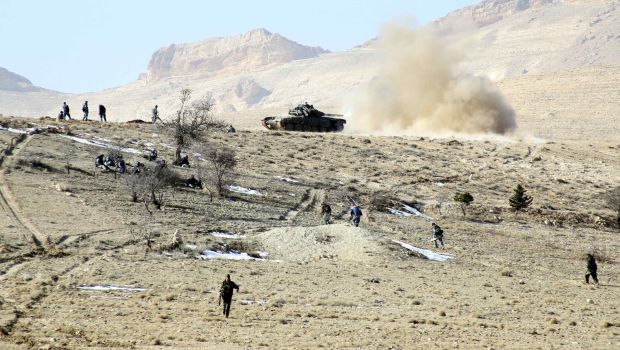
Forces loyal to Syria’s President Bashar Al-Assad are seen in the Qalamoun mountains north of Damascus. Syria’s army ambushed Islamist fighters in the Qalamoun mountains north of the capital Damascus on Friday, leaving as many as 60 people dead, the Syrian Observatory for Human Rights said (REUTERS/SANA/Handout via Reuters)
London, Asharq Al-Awsat—In another sign of the increasing predominance of extremist Islamist groups within the Syrian opposition, a prominent UK-based human rights watchdog claimed on Monday that it has received death threats from an Al-Qaeda-affiliated militant group.
The pro-rebel Syrian Observatory for Human Rights (SOHR), which uses a network of activists on the ground in Syria to compile and release information about casualties and human rights violations in Syria’s ongoing conflict, released a statement on Monday saying it had been accused of fabricating news by the Islamic State of Iraq and Syria (ISIS).
In a statement issued on its website on Monday, the SOHR said Islamists stepped up threats against the SOHR, which is based in Coventry, England, after it published a report on the death of dozens of Islamist rebels in an ambush by Syrian government forces at the end of last week.
ISIS denied the reports, and accused the SOHR of fabrication.
According to the statement, the accusations come as part of a “systematic smear campaign against the SOHR and its activists launched by some of those who describe themselves as rebels.”
In exclusive comments to Asharq Al-Awsat, SOHR director Rami Abdul Rahman said that the organization had been receiving threats from Islamist rebel factions for a long time, but that they had recently increased.
According to Abdul Rahman, ISIS has recently begun to apply mounting pressure on the SOHR to provide it with the identities of media activists and news providers on the ground in Syria.
Abdul Rahman said: “Our [media] sources are under threat from [Al-Qaeda-linked] ISIS,” and added that the Islamist rebel faction was no different from the Syrian government.
“[Islamist] groups are trying to locate our [media] sources operating in areas under their control,” he said, particularly in the northern and eastern parts of Syria as well as in the southern Rif Dimashq governorate.
The SOHR, which Abdul Rahman established in the UK in 2006, has a network of “two hundred and thirty activists [in Syria] including school teachers, lawyers, journalists and medical doctors who collect news from more than 5,000 individuals across Syria,” he said.
Abdul Rahman claimed that the SOHR’s network of sources came from various backgrounds in Syria, and included medical professionals, civilians, and even members of the military. As for the verification process the organization follows, Abdul Rahman said that the news providers he worked with were trustworthy and not motivated by material gain, though he admitted he paid news providers enough money to cover their operating expenses.
Abdul Rahman said he had brought the threats to the attention of the British police, and added that the SOHR would continue its activities despite the threats.
